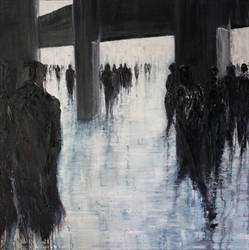Introduction
In modern British music, few songwriters capture the spirit of the times with as much skill as Alex Turner. His song “Piledriver Waltz,” first heard in the film “Submarine” and later on the Arctic Monkeys’ album “Suck It and See,” shows Turner’s talent for crafting detailed stories through music. This song not only touches the heart but also subtly engages with the unease of our times.
This article will explore “Piledriver Waltz,” revealing how its somber tone and poignant lyrics create a sense of introspective melancholy and reflect broader societal disillusionment. In a world dealing with political chaos, social injustice, and unfulfilled promises of progress, Turner’s lyrics feel deeply familiar. We will see how the song mirrors the dissatisfaction common in today’s world and how art reflects our reality.
Setting the Stage: Societal Disillusionment
Disillusionment, the feeling of being let down by unmet expectations, defines the modern collective psyche. It shadows our bright stories of progress and prosperity. This feeling spans politics, where promised change often stalls, to social arenas plagued by persistent inequalities. The advances of the digital era have not bridged human alienation.
The term disillusionment suggests breaking the false promises we once believed. In “Piledriver Waltz,” this disillusionment underpins Turner’s vivid lyrics. The song captures a sense of resignation to the harsh realities of modern life, mirroring a world tired of bad news, bitter partisanship, and uncertain futures.
This backdrop sets the stage for exploring disillusionment as laid out in “Piledriver Waltz.” The song becomes a canvas for Turner’s words to paint a picture of a troubled, introspective emotional state. Within the song, we see a reflection of broader societal unrest and disillusionment, a moment where music meets the hearts and minds of those navigating the 21st century.
Reflecting Reality’s Breakdown
“Piledriver Waltz,” with its gentle melody and soft vocals, hides a deep sense of disappointment in its narrative. Alex Turner’s lyrics connect with the disillusioned soul, using metaphor and imagery to express betrayal and broken expectations.
The title itself, referencing a wrestling move (piledriver) known for its forceful end, contrasts with the elegant waltz. This paradox highlights the clash between our desires and harsh reality.
Turner starts with, “I etched a face of a stopwatch, on the back of a raindrop,” creating an image of trying to capture time on something fleeting. This reflects the futile attempt to find stability in an unpredictable world. The next line, “And did a swap for the sand in an hourglass,” suggests trading one fleeting thing for another that also signifies time’s passing. Even an hourglass must be turned over repeatedly, symbolizing the cycle of disappointment.
A striking line is, “The morning was complete when there were tears on the steering wheel, dripping on the seat.” Here, morning, usually a symbol of hope, ends in tears—suggesting a day beginning with defeat. The steering wheel and seat, normally associated with control and direction, become symbols of sorrow and lack of direction.
Turner sings about a character heartbroken by “the news,” a feeling many can relate to in an age filled with distressing events. The heartbreak isn’t specified; it represents the universal feeling of being let down by the world.
Musical Dissonance: Echoing Inner Turmoil
The music of “Piledriver Waltz” is rich with dissonance, echoing the inner turmoil of disillusionment. The waltz, a dance of structure and grace, contrasts with the piledriver’s forceful impact. This highlights the gap between expectations and reality.
The waltz traditionally symbolizes elegance and romance, while the piledriver represents sudden, harsh reality. The music suggests a life that should be smooth and harmonious, but the lyrics reveal chaos and heartbreak.
Turner’s use of the waltz suggests lost order, with its regular tempo contrasted by the unpredictable nature of life. This musical dissonance amplifies the song’s message, showing a society caught between a desire for a stable past and a chaotic present.
Conclusion
Alex Turner’s “Piledriver Waltz” is a detailed and touching portrayal of disillusionment set against societal upheaval. With its blend of sharp lyrics and evocative melodies, Turner captures the collective and personal heartbreak of modern life. Yet, the song is more than a lament; it reflects the complexities of life, challenging us to find beauty amid chaos.
The song offers not just commentary on the world but also a space for emotional connection. Music, as shown by Turner’s work, is both artistic expression and a way to navigate life’s ups and downs with mutual understanding.
“Piledriver Waltz” could become an anthem of solidarity, showing music’s power to articulate struggles, comfort us in disillusionment, and remind us of our shared humanity in a fragmented world. Even amidst broken dreams, art reminds us of camaraderie, solace, and the strength to continue.

